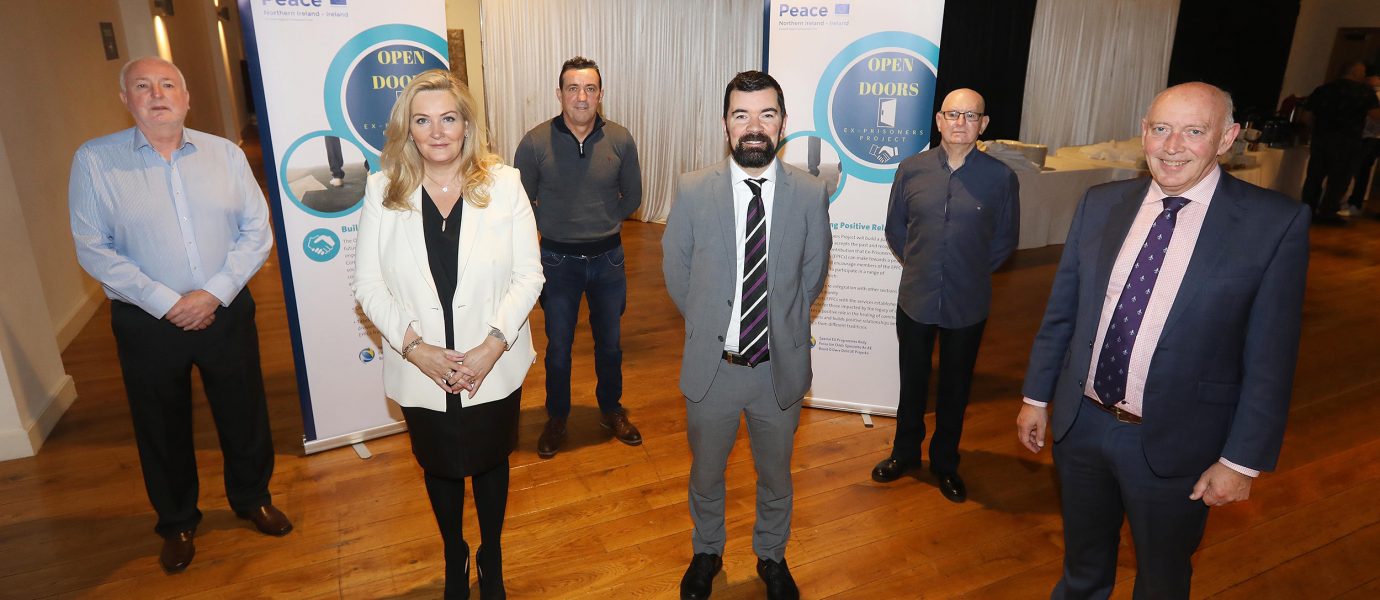Open Doors programme closes
A ceremony has been held to mark the closure of a Co-operation Ireland led programme to help members of the ex-prisoner/former combatant community reintegrate into society.
Open Doors was a three year £1.7m regional initiative designed to build positive relationships between the ex-prisoner/former combatant community and wider society.
Funded through the European Union’s PEACE IV Programme, which is managed by the Special EU Programmes Body, the project was led by Co-operation Ireland working in partnership with Charter NI, the Ex-Prisoners Interpretative Centre, Teach Na Failte and the Plough Historical and Cultural Group.
Match-funding was provided by the Executive Office in Northern Ireland and the Department for Rural and Community Development in Ireland.
Open Doors was developed over a two-year period and designed to run for three years. A six-month extension was granted because of time lost due to the Covid-19 pandemic.
The aims were to encourage members of the ex-prisoner/former combatant community to participate in a range of activities which:
- Promoted re-integration with other sections in the community.
- Connected with services established to provide for those impacted by the legacy of conflict.
- Played a positive role in the healing of community divisions and the future development of our society.
To meet these objectives the ex-prisoner/former combatant groups organised six seminars covering topics which included, aging among the ex-prisoner population, Brexit, anti-sectarianism, anti-racism, mental health and legacy.
In addition, over 400 participants underwent conflict transformation training, with 20 completing a sustainable leadership training programme designed and delivered by Liverpool University.
Welfare and benefit support clinics set up through the programme engaged over 11,000 people.
Minister of State for Rural and Community Development, Joe O’Brien TD, said: “I would like to congratulate all those involved in the successful implementation of the Open Doors project which was funded by the EU PEACE IV Programme.
“I am delighted that my Department was able to provide funding and support for this very important project that delivered a suite of training programmes, seminars and outreach clinics, and engaged with many former prisoners and/or combatants who would be at a higher risk of social exclusion and marginalisation.
“We are dedicated to creating a shared and bright future for everybody, and this project, which developed the skills needed to cope successfully with diversity and difference, will help increase social inclusion which benefits everyone in the long run.”
Co-operation Ireland CEO Peter Sheridan said: “The issue of ex-prisoners/former combatants and their integration into society had remained a concern since the signing of The Good Friday/Belfast Agreement. Research ahead of the launch of Open Doors showed that this community was continuing to face many barriers because of ongoing stigma.
“Open Doors was designed to address these issues with the aim of improving relationships between the ex-prisoner/former combatant community and wider society, and over the three years of the programme a great deal of progress was made. I want to pay tribute to everyone who worked to make it a success.”
Congratulating the project on its conclusion Gina McIntyre, Chief Executive of the SEUPB said: “The EU PEACE IV Programme has been designed to provide support to many sectors that have been negatively impacted or marginalised as a result of our shared past. The Open Doors project is an excellent example of support to a sector to address some of the more complex aspects of reconciliation. This is vital to the creation of a more peaceful and forward-looking society.
“The project has helped to highlight many of the concerns faced by the ex-prisoner population such as access to employment, higher than average insurance premiums, travel restrictions and even difficulties over adoption. It has also helped to raise awareness about the stigma that ex-prisoners and their families are still subject to, on a daily basis. Through a series of training seminars and outreach support clinics, delivered even during the pandemic, it has made a significant contribution in helping to support the re-integration of the ex-prisoner/former combatant community back into society.”

